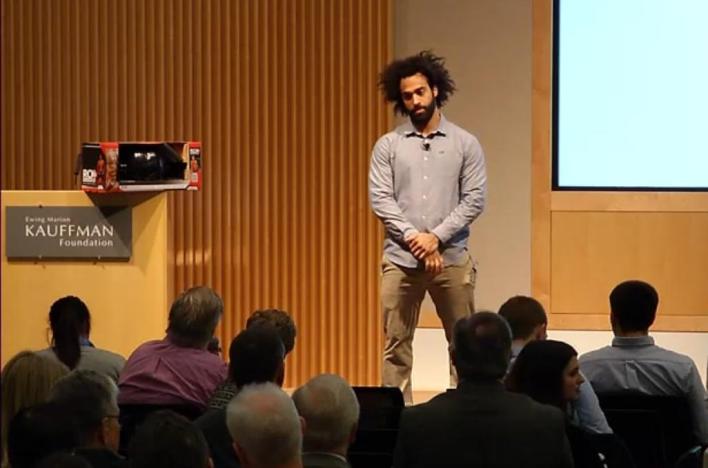A fitness professional pitching an innovative piece of exercise equipment and a serial entrepreneur discussing his current startup’s cloud-based system of measuring farm activity were the featured speakers at this week’s 1 Million Cups at the Kauffman Foundation.
Rock 360
Tommy Sanders showed a video of himself getting down on the floor and using the Rock 360, an ab roller he invented for people to do “traditional exercises with a twist,” he said.
Unlike other ab rollers on the market, the Rock 360 has a clip-on for a smart phone so that users can download integrated apps to watch instructional workouts or play motivational video games while using the product.
“We want to bridge the gap between fitness professionals and the everyday consumer,” said Sanders, a three-year starter for the University of Missouri football team who also played for the NFL’s Detroit Lions. “We want to make it easy to work out.”
Sanders said his product’s target market was folks 30 to 50 years old—with an emphasis on women over 40—who are interested in a full-body workout that can be conveniently done at home.
While the Rock 360 is currently available for $89.95 through the company’s website and at Amazon.com, Sanders said that he’s really looking for retail chain stores to bring the product to consumers.
“How do we go from selling 2,000 units to 2 million units a year?” Sanders said. “We really need distribution and marketing.”
Farmobile
Jason Tatge, a former Pipeline Innovator of the Year who sold his last tech company to DuPont, talked about his third and latest startup, Farmobile, and how it uses a cloud-based system to allow farmers to “turn tractor data into dollars.”
The Farmobile system uses a device that costs farmers about $2,500 and can be easily installed in a modern tractor’s diagnostic dashboard. The device gathers virtually real-time data every time that piece of farm equipment drives across a field. In turn, farmers can sell their information to an agricultural industry that’s “hungry for data,” Tatge said. The newer the tractor, he said, the more data that can be collected.
“Ultimately, the revenue stream for a farmer should be $10,000 to $15,000, if we’re doing our job right,” Tatge said.

